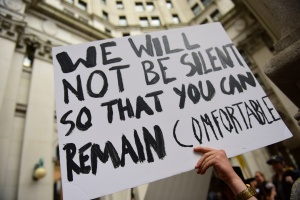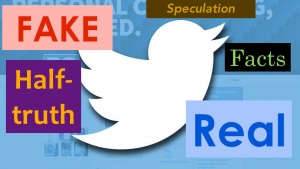Freedom of Expression
Freedom of expression is the right that every person is able to express their opinions and beliefs in any manner and on any platform. Freedom of expression coincides with the First Amendment of the U.S. Constitution, freedom of speech, which prohibits Congress from making any law that would abridge freedom of speech. However, many social media platforms restrict freedom of expression in practice as a means of policing impermissible content. To protect their users and reputation, most social media companies govern users through their terms of service. Yet, the line at which free speech devolves into impermissible speech is blurry, so this kind of censorship creates a lot of controversial effects.
Contents
History of Freedom of Expression
The Freedom of Expression is a Campaign led by the Freedom House organization, and a topic supported by the ACLU. The basis for the Freedom of Expression is the Freedom of Speech, in the United States. Freedom of speech is protected by the First Amendment to the United States Constitution. As a form of expression, speech freedoms have been litigated in the judicial system since the First Amendment was adopted into the Bill of Rights in 1791. Courts have found that freedom of expression can be restricted, only in cases where it may cause direct and imminent harm to others. Courts have also ruled in favor of content neutrality, which prohibits the discrimination of expressions just because some in the population may find the content offensive.[1]. The First Amendment allows for governments to enact "reasonable time, place, and manner" restrictions and regulations on free speech while including the incorporation doctrine, which prevents further governmental restrictions on free speech. Private institutions are not protected by the incorporation doctrine and are allowed restriction of free speech, barring laws, allowed to restrict business and private institutional free speech de facto regulation.
Communications Decency Act (CDA)
The Communications Decency Act of 1996 is the primary set of laws for protecting free speech on the internet. It contains Section 230, which holds that "No provider or user of an interactive computer service shall be treated as the publisher or speaker of any information provided by another information content provider." This protects websites, blogs, forums, and other online platforms from being held legally responsible for the content of their users. CDA Sec. 230 considers platforms and ISPs legal intermediaries, and not the authors or providers of the objectionable content. If CDA did not provide its protections, platforms could be held liable for individual lawsuits regarding each piece of content, would have to pass on legal costs of compliance to its users, and would have to censor its content, which would hinder the internet's ability to provide crucial information.[2]
Jones v. Dirty World
Dirty World Entertainment Recordings hosts a website that anonymously posts photographs, videos, and comments that are submitted by its users. Before posting the content, the manager of Dirty World, Nik Richie, would edit to remove nudity, obscenity, threats of violence, and racial slurs, along with adding his own comments. Between October to December 2009, Dirty World posted numerous pictures and comments about Sarah Jones, who was a teacher and former NFL cheerleader, regarding her personal life and career. Jones made 27 requests to Richie to remove the content, and after he failed to do so, Jones filed a civil lawsuit against him and Dirty World on claims of libel, defamation, and intentional infliction of emotional distress. The District Court ruled that Dirty World was not protected by CDA Sec. 230 because it was not only the interactive computer service provider, but also became the content provider by 'developing' the inflammatory content. Users were not simply uploading the content; Richie, the website manager, chose which content to post and then added his own comments, which materially contributed to and developed the content. The U.S. Sixth Circuit Court of Appeals overturned the District Court ruling and found that Richie did not 'develop' the content, because selecting posts for publication was not materially contributing to their defamatory nature. The Court ruled in favor of Richie and Dirty World, and established the "material contribution test" to determine if service providers materially contributed and developed content, rather than just providing the platform service.[3]
Politics and Free Speech
Issues revolving around freedom of expression and hate speech arose during the 2016 election. The extremism of this election created a drastic polarization of both political parties in the United States. As Misha Teplitskiy and Feng Shi describe in “The Wisdom of Polarized Crowds,” people have used their freedom of expression in the form of politics even if the content is not related to the political climate. [4]When looking through social media platforms, specifically Facebook and Twitter, it is inevitable to find a political argument taking place. Even if politics are uncomfortable to talk about, people have the right to post due to their right to free speech.The 2016 election is an example where extreme polarization occurred with both sides voicing their strong opinions. With the racist remarks made by Donald Trump, the question arose of what deserves to be censored or not as well as what is classified as "hate speech". The term “liberal snowflake” was born as those on the left pointed out the inappropriate comments that should not be said while Republicans stood behind this idea of freedom of expression. This brings up the controversy of what speech should be restricted versus pass as freedom of expression. There is no law or jurisdiction currently in place that legally classifies hate speech separate from free speech, thus, allowing individuals to speak in a hateful manner and remain unpunished. However, given the context of the speech, if it causes fear or harm it may be subjected to punishment.[5]
Social Media Terms & Conditions
Lately, alt-right groups have become more prominent on social media. Alt-right groups are often criticized for their racist and sexist hate speech. Yet, these groups use social media as an outlet to express their beliefs to a large audience. David Duke is a well known white nationalist who uses Twitter to express his extreme ideas[6]. Although Duke's speech often disrespects specific people, nationalities, and groups, he is protected by his right to freedom of expression and will not be censored unless he violates Twitter's terms of service. This indicates that Twitter champions freedom of expression, regardless if tweets promote violence or hate. Twitter has also received many complaints about verifying the accounts of white nationalists like Duke[7]. A verified user has a blue checkmark next to his name, indicating that the person is in fact who he claims to be and is also a recognized member of the Twitter community.
Facebook is also a social media platform that causes political discourse. Politics are often discussed on the Facebook news feed. Many of the strong political opinions are catalyzed by satirical websites, like the Onion[8], and biased sources, like Occupy Democrats[9]. Although these sources post exaggerations of the truth or blatant lies, their content cannot be legally removed because they are protected by the right to free speech.
Facebook has also been in trouble for the “fake name policy” deeming that a user can be reported for not using their legal name. This puts one’s freedom of expression on the social media platform into question. If someone has gone through a gender transition or feels resentment towards their families, for example, they will tend to change their names to feel comfortable.[10] The “real name policy” strips away the true identity of a user and ultimately their freedom of expression by allowing other users to paint their profiles rather than themselves. Social media platforms pick and choose what qualifies as freedom of expression.
This past March, Facebook founder and CEO Mark Zuckerberg expressed the need for a more active role for government regulation. He explains that while individual internet companies should be accountable for monitoring harmful content, there needs to be a more standardized approach to serve as a "common global framework" [11].
Ethics and Freedom of Expression
Along with being able to express ourselves, there is the possibility of false information being spread in the form of “fake news.” The rapid spread of lies online raises the concern of how ethical freedom of expression can be. Shannon Vallor implies in “Social Networking Virtues” that being truthful in what you post online affects how authentic others perceive your online persona to be. Many overexaggerate or lie about themselves on social media with the intentions of gaining popularity.[12] Honesty is connected to how we perceive each other online in relation to our authenticity. Lying on the internet has many consequences, and the credibility of words spread online comes into question with the normalization of “fake news,” affecting our outlooks on important topics like politics.
The rationale behind this can be due to the norms of online communities. Users are more likely to conform to social norms when an audience is present, causing them to be more likely to create lies and act maliciously towards others. Alain Cohn would suggest in his article "Honesty in the Digital Age" that users feel less observed and pay less attention to their actual identities.[13] Displaying one’s freedom of expression online versus in real life differs as there is not a way for one to validate another user’s identity online if they do not know the user personally.
References
- ↑ "Freedom of Speech," History.com, www.history.com/topics/united-states-constitution/freedom-of-speech
- ↑ "Section 230 of the Communications Decency Act," EFF, www.eff.org/issues/cda230
- ↑ "Jones v. Dirty World Entm’t Recordings LLC." Columbia University: Global Freedom of Expression, globalfreedomofexpression.columbia.edu/cases/jones-v-dirty-world-entmt-recordings-llc/
- ↑ Teplitskiy and Shi (2018). The Wisdom of Polarized Crowds.
- ↑ “Free Speech vs. Hate Speech.” NPR, NPR, 5 June 2018, www.npr.org/2018/06/01/616085863/free-speech-vs-hate-speech.
- ↑ Duke, David. “David Duke (@DrDavidDuke).” Twitter, Twitter, 28 Mar. 2019, twitter.com/DrDavidDuke.
- ↑ Binder, Matt. “Seth Rogen Calls out Twitter's Jack Dorsey for the Platform's White Supremacist Problem.” Mashable, Mashable, 3 July 2018, mashable.com/article/seth-rogen-twitter-jack-verified-white-supremacists/#MOdY1LmgqqqD.
- ↑ “America's Finest News Source.” The Onion, The Onion, www.theonion.com/.
- ↑ Cohen, Brian Tyler. “Moving America FORWARD.” Occupy Democrats, 5 July 2018, occupydemocrats.com/.
- ↑ Haimson, Olivia L. and Anna Lauren Hoffmann. Constructing and enforcing "authentic" identity online: Facebook, real names, and non-normative identities. 6 June 2016.
- ↑ Zuckerberg, Mark. https://www.washingtonpost.com/opinions/mark-zuckerberg-the-internet-needs-new-rules-lets-start-in-these-four-areas/2019/03/29/9e6f0504-521a-11e9-a3f7-78b7525a8d5f_story.html?utm_term=.80c716cba527
- ↑ Shannon Vallor, 11 Aug 2009, Social networking technology and the virtues
- ↑ Alain Cohn et al. Honesty in the Digital Age. Feb 2018.

